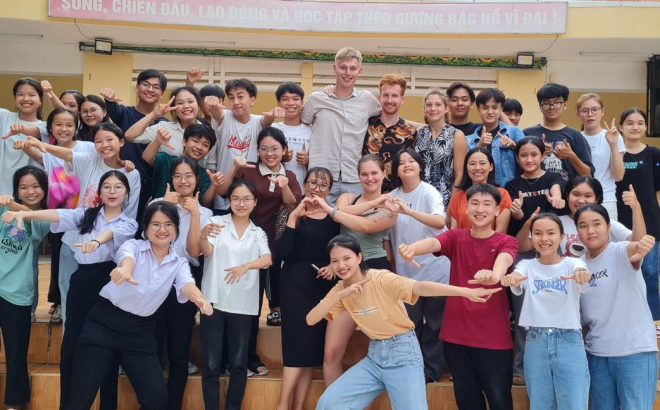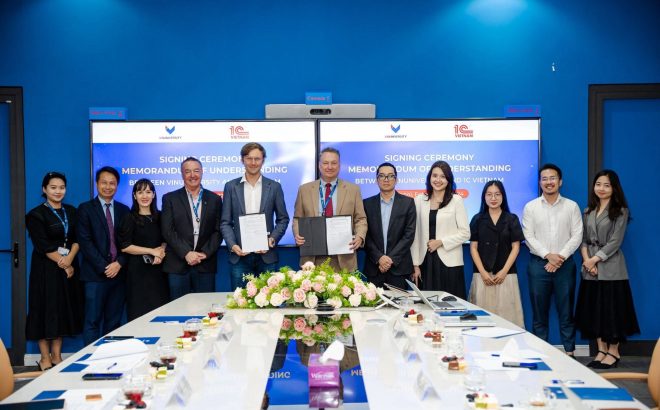Welcome Professor Laurent El Ghaoui – Dean of the College of Engineering & Computer Science, VinUniversity
VinUniversity is very honored to welcome Prof. Laurent El Ghaoui as VinUniversity’s new Dean of the College of Engineering & Computer Science. Before joining VinUniversity, Prof. El Ghaoui taught at the Department of Electrical Engineering & Computer Science and Department of Industrial Engineering & Operations Research at University of California, Berkeley (ranked #32 worldwide according to the QS World University Rankings 2021). He also taught Data Science within the Master of Financial Engineering at UC Berkeley’s Haas Business School.

Prof. El Ghaoui has been listed among the world’s top 2% most cited scholars across all scientific disciplines according to PLOS Biology (2020). Particularly, in the field of Industrial Engineering & Automation, he is ranked among the top 0.3% of the world’s scientists based on the impact of his publications. In addition, according to Google Scholar, he has nearly 60,000 citations. Professor. El Ghaoui’s h-index is 58, a truly exceptional achievement. Besides being a researcher and a lecturer, Prof. El Ghaoui is also a consultant and an entrepreneur. According to him, these experiences solving real-world problems have supplemented his research life tremendously.
Prof. El Ghaoui has over 30 years of experience in the field of optimization. Optimization is a mathematical language that underpins most of the relevant models in engineering and computer sciences. According to Prof. El Ghaoui, “Optimization is a wonderful “bridge” between disciplines, translating a “world problem” into a “math problem”. Optimization models can describe the operations of a refinery, a power plant, irrigation systems, an autonomous car, a financial trading system, the evolution of a disease, etc. Therefore, in my career I have been able to work on very diverse application areas, related to healthcare, energy, finance, etc”. In his most recent research, Prof. El Ghaoui is attempting to connect all his past work into a single framework called “implicit models”, which include most of the very complex prediction models called deep neural networks.
Prof. El Ghaoui has over 20 years of experience working with enterprises to solve real-life issues. He was the co-founder and Executive Chairman of SumUp Analytics, Inc. – a company that built a real-time text analytics software platform. Currently, he is co-founder and scientific advisor of Kayrros SAS, a Paris-based startup that delivers real-time intelligence to energy markets using data such as satellite images. “I believe such efforts will be crucial to address the big challenge of our climate, including, for example, monitoring and reducing methane emissions”, said Prof. El Ghaoui. He has been involved in many consulting projects in the fields of energy management, advertising, finance, etc. Because of his vast expertise, Prof. El Ghaoui is frequently invited to be a guest speaker at events held by Twitter, Google, Amazon, Exxon, Walmart, and many other companies and institutions on the topic of optimization.
Below is our conversation with Prof. El Ghaoui, Director of VinUni’s Dean of the College of Engineering & Computer Science, regarding the College’s development in the near future.
Q. Why did you decide to become the Dean of College of Engineering & Computer Science at VinUniversity?
A. I was struck by the ambition and drive of VinUniversity’s team. The world is currently facing several inter-related crises, from health to climate to energy and water. The education field itself is under tremendous pressure to adapt to a fast-changing market, which involves new concepts and technologies. Being a relatively new institution, with lots of agility, I believe that VinUniversity can be at the forefront of this transition and hopefully become an educational hub of the region.
Q. As the Dean of College of Engineering & Computer Science (CECS), what plans do you have in mind for CECS?
A. I envision developing CECS as a hub that can act as a bridge between the different parts of the University, and strongly interact with the other Colleges and the Faculty of Arts and Sciences. This can be done, for example, through project-based classes that mix different groups of students, each bringing their contribution to a common project. On the teaching front, we will develop our courses in the direction of “flipped class” learning, which encourages student participation and creativity. I am especially interested in creating classes and Master programs around innovation and startups, with a strong programming component. For example, there are strong business opportunities in the area of blockchain, of which crypto-currencies are just one publicized example. Another area that builds on the existing strengths of our College is “field programmable gate arrays” (FPGAs), which offer unprecedented speed ups in computation. These architectures are hard to adapt to advanced machine learning models such as neural networks, which limits their implementation on small devices such as smartphones.
I am also keen on further developing strong ties to institutions worldwide, so our University can become a gateway to a fruitful educational experience abroad for our students. I have seen very strong interest from several potential partner institutions, which see opportunities in our excellent students, as well as the availability of data that we can provide, for example in the medical field. Here, the interaction with Vingroup is a crucial element of support. In addition, we will strive to organize research workshops and events here, as well as invite distinguished scholars from around the world.
Q. There have been unprecedented breakthroughs in technology. The labor market for engineers, scientists, and researchers is in short supply. How should CECS students better prepare themselves, in terms of skills and work experience?
A. Good students know how to learn a given material; excellent ones know how to choose and learn new material by themselves. In today’s world, there is no shortage of sources of knowledge: the challenge is not scarcity anymore, it is the inflation of knowledge. For example, each week there are hundreds of new articles in the specific area of computational linguistics. How do you keep track of such an onslaught of information? Without doubt, technologies from natural language processing have a role to play. But before these make their mark, at this point I would say that the greatest skill to acquire may be to “learn how to learn” in a digital world. Perhaps the best way to hone this skill is to teach a topic that you do not know well to your fellow students.
To learn more about Prof. Laurent, please visit https://vinuni.edu.vn/people/laurent-el-ghaoui-phd/



